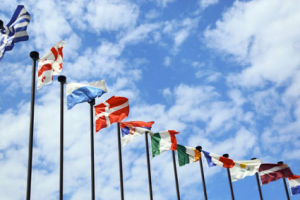7 Country ETFs Worth Owning Outside U.S.
 These seven ETFs will give you plenty of geographic diversification
These seven ETFs will give you plenty of geographic diversification
Home-country bias is a particular ailment that investors suffer from whether you live in the U.S., Canada, the United Kingdom or any other country with a significant stock market. It’s impossible to run away from and it’s a big reason why Americans ought to consider owning country exchange-traded funds outside of those tracking the S&P 500.
How so?
The United States is shrinking. No, not literally, but if you consider that there were 9,100 U.S.-listed public companies in 1997 and today there are approximately 5,700, the average investor has seen their options shrink by almost 40% in just two decades.
Meanwhile, the number of stocks listed globally has ballooned to 33,000 at the end of 2016, up from 23,000 in 1995. This means that while the number of U.S. stocks has shrunk, the number of stocks listed outside the U.S. has increased by almost 100% over the past two decades to 27,300.
So, two decades ago, U.S. stocks accounted for 40% of the world’s publicly traded companies; today, that’s down to 17%, a number that leads us to a simple question.
Why not own a country ETF or two outside the U.S.? Why not, indeed.
For those who can see the forest through the trees, here are seven country ETFs worth owning outside the U.S.
Country ETFs Worth Owning: Japan
This particular ETF is what put WisdomTree Investments, Inc. (NASDAQ:WETF) on the map because it was one of the first single-country, currency-hedged ETFs.
“DXJ provides investors with exposure to Japanese stocks while mitigating the impact of the yen’s gyrations against the dollar,” wrote InvestorPlace contributor Todd Shriber on Sept. 22. “Japan makes for one of the ideal markets for currency-hedged ETFs because of the country’s export-driven economy, the world’s third-largest, prefers the yen to be weaker.”
Over the past five years, the DXJ has delivered an annual return of 18%, 300 basis points higher than the S&P 500. In 2008, when the S&P 500 lost 37%, DXJ was off 21%, significantly less than the index.
If I had to pick between a China ETF and a Japan ETF, I’d be more inclined to go with the latter because it’s a developed rather than emerging market.
Country ETFs Worth Owning: UK
Sometimes it makes sense to follow the crowd and other times you’ve got to find your own way. In this instance, I’m suggesting you follow the crowd and buy the iShares MSCI United Kingdom ETF (NYSEARCA:EWU) whose $2.6 billion towers over the handful of alternatives.
It’s frustrating to pay 0.48%, or $48 per $10,000, but it’s the best way to capture the UK equity markets. I think you’ve got to put the notion out of your head that you pay just 0.04% or one-tenth the fee for iShares’ S&P 500 product.
Just forget about it.
The UK, despite Brexit concerns, is still home to many of the world’s largest companies. The ETF has an average market cap of $51.4 billion, significantly higher than its benchmark.
This is blue chip all the way.
Country ETFs Worth Owning: Germany
The only difference being that the HEWG is hedged and that privilege costs you an extra five basis points at 0.53% annually. The only holdings of the hedged version are units of the EWG and cash. Otherwise, they’re the same.
One of the best features of EWG is the number of holdings. With just 59 stocks and a top ten that accounts for 56% of the ETFs $4.7 billion in assets, it’s much more focused than iShares’ UK ETF, which has almost double the number of stocks.
The EWG has achieved an annual total return of 9.7% over the past five years, more than double the EWU’s UK performance over the same period.
Andrea Merkel continues to look like the dominant leader in Europe, despite recent calls for her ouster and disappointing election results.
Germany remains mainland Europe’s economic engine.
Country ETFs Worth Owning: Canada
Nine times out of 10, owning EWC is the right call because the U.S. dollar is generally the stronger currency, but there have been times in the past when the Canadian dollar has been worth more than the greenback — the last time in 2012 when the loonie spent the better part of two years above par.
If you like owning banks — Canadian banks are some of the safest in the world — you’ll like EWC. All five of Canada’s big banks are in the top ten holdings; they account for 28% of the ETFs overall portfolio.
There are a total of 93 holdings in the portfolio with financials and energy stocks accounting for 42% and 22% of the ETF respectively. If you don’t like financials and energy stocks, you’re going to be disappointed with any country ETF that’s got a Canadian focus.
Like many of iShares’ other country ETFs, it charges 0.48% annually.
Country ETFs Worth Owning: China
However, I’m going with the WisdomTree China ex-State Owned Enterprise Fund (NASDAQ:CXSE) as my China pick for two reasons.
First, it’s the least expensive of the China ETFs available with a management expense ratio of 0.32%, 27 basis points lower than the next cheapest alternative. Normally, I’m a big believer in not being cheap about paying for advice, which leads me to my second reason for owning CXSE.
The CXSE invests in Chinese companies that aren’t state-owned enterprises. The index it tracks defines this as less than 20% ownership. Given the political nature of China’s economic system, I see this as an excellent way to avoid government interference. Realistically, all Chinese companies pose an extra level of risk; no China ETF can eliminate this issue.
Unlike the Canadian country ETF earlier, financials represent just 15% of the $58 million in total assets with the information technology and consumer discretionary sectors accounting for 57% of the portfolio’s total weighting. Its top-10 holdings represent 48% of the total.
Country ETFs Worth Owning: Brazil
I’ve always liked First Trust’s approach to ETF investing. Their products are innovative and different from the plain vanilla offerings from iShares and Vanguard. When dealing with an emerging market like Brazil, I think it provides investors with an advantage over the iShares offering.
FBZ tracks the NASDAQ AlphaDEX Brazil Index, which selects stocks from the NASDAQ Brazil Index that meet certain value and growth criteria including price to sales, price to book, price to cash flow and returns on assets amongst others.
Reconstituted and rebalanced twice a year, the median market cap is just $5.1 billion, meaning you’re buying a mid-cap ETF rather than a large-cap. In existence since April 2011, it’s got a negative annual return. That being said, it’s up 30% year to date through Oct. 25 after a 57% return in 2016.
This isn’t every investor’s cup of tea — a management expense ratio of 0.8% will keep many away — but if you believe in the Latin American spirit, FBZ will get you outsized returns over the long haul. Just remember to buy on the dips because there will be big ones from time to time.
Country ETFs Worth Owning: South Africa
Well, almost exclusively. It does have 4.2% of its portfolio invested in the Netherlands and 1.9% in the Isle of Man, but that’s more to do with taxation than anything else. All 54 of EZA’s holdings operate medium- and large-sized companies in South Africa.
Previously, I took a swipe at iShares’ plain vanilla offerings, but if not for its big reach, anyone interested in investing in South Africa — I went to high school with some South Africans who emigrated to Canada — would be out of luck, from an ETF standpoint, at least.
Like Brazil, I have high hopes for the African nation, and if you’re looking for a country ETF outside Asia or Europe, this one should be at the top of your list. As South Africa goes, so goes the entire continent.
As an emerging-market country ETF, the management expense ratio of 0.60% is not out of line. One of the top ten holdings is Remgro Ltd (OTCMKTS:RMGOF), a holding company controlled by South Africa’s Rupert family, who also control Compagnie Financiere Richemont AG (OTCMKTS:CFRUY), the people behind Cartier.
I would buy this ETF just to own Remgro.
As of this writing, Will Ashworth did not hold a position in any of the aforementioned securities.
See Also From InvestorPlace:
- 5 Tech Stocks to Buy With Monster Yields
- The 10 Best Dividend ETFs for Yield-Hungry Investors
- 7 Straight-A Stocks to Buy ASAP
Category: Foreign Market ETFs




